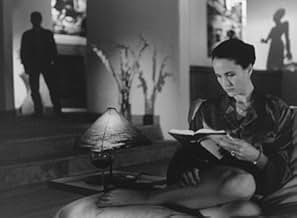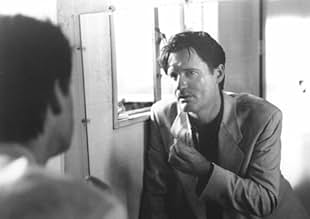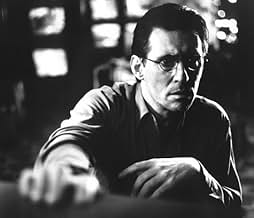IMDb RATING
5.6/10
5.5K
YOUR RATING
Mike is a successful Hollywood producer of violent movies. Then he himself experiences extreme violence, goes missing, joins some Latino gardeners and reviews his life.Mike is a successful Hollywood producer of violent movies. Then he himself experiences extreme violence, goes missing, joins some Latino gardeners and reviews his life.Mike is a successful Hollywood producer of violent movies. Then he himself experiences extreme violence, goes missing, joins some Latino gardeners and reviews his life.
- Awards
- 1 win & 4 nominations total
Nicole Ari Parker
- Ade Kenya
- (as Nicole Parker)
Samuel Fuller
- Louis Bering
- (as Sam Fuller)
Featured reviews
This is an astounding movie, and as others have noted, it is precisely the kind of movie that passes most people by because it rocks so gently as to be almost imperceptible.
The first time I saw this, I was disappointed. 'Until the End of the World', to me, is a brilliant piece of work, with more beauty, reverie, and complexity than any ten average films put together.
So...I was ready for some heady stuff with 'End'. But the movie seemed to be lost, missing in action.
But six months later I watched it on video, and I realized I was looking at an entirely different movie.
Then I watched it again...and again, and again, until I'd seen the thing ten times, including one where I only listened to the film, to see if I was simply addicted to Wim's luminous visuals.
What you realize is that this film is cooking up some very threatening ideas about the quality and nature of love, and the companion six degrees of violence and hatred. It is really about the way in which fear and love pulse in contrary and similar ways, much like particle and wave, dancing together.
It's also a fantastic critique the "confederacy of dunces" and the manner in which we manufacture enemies to suit our paranoia.
I must say that there are few directors that move me as much as Wim Wenders, and I have to confess that I have cried many times over the beauty and grace of some of the scenes and visuals in this movie. Much like Robert Altman or Atom Egoyan, Wenders cares about people, believes in their struggles, and he creates tension that moves them, at least temporarily, to understand their natures more fully.
A masterpiece, if a masterpiece means your heart moves even slightly...
PS Ry Cooder's soundtrack is brilliant!
The first time I saw this, I was disappointed. 'Until the End of the World', to me, is a brilliant piece of work, with more beauty, reverie, and complexity than any ten average films put together.
So...I was ready for some heady stuff with 'End'. But the movie seemed to be lost, missing in action.
But six months later I watched it on video, and I realized I was looking at an entirely different movie.
Then I watched it again...and again, and again, until I'd seen the thing ten times, including one where I only listened to the film, to see if I was simply addicted to Wim's luminous visuals.
What you realize is that this film is cooking up some very threatening ideas about the quality and nature of love, and the companion six degrees of violence and hatred. It is really about the way in which fear and love pulse in contrary and similar ways, much like particle and wave, dancing together.
It's also a fantastic critique the "confederacy of dunces" and the manner in which we manufacture enemies to suit our paranoia.
I must say that there are few directors that move me as much as Wim Wenders, and I have to confess that I have cried many times over the beauty and grace of some of the scenes and visuals in this movie. Much like Robert Altman or Atom Egoyan, Wenders cares about people, believes in their struggles, and he creates tension that moves them, at least temporarily, to understand their natures more fully.
A masterpiece, if a masterpiece means your heart moves even slightly...
PS Ry Cooder's soundtrack is brilliant!
How 'bout a four? Visually, there are some great moments. I think the most interesting scenes are those where there is no dialogue but the camera follows the characters as they inwardly contemplate what this all means (Bill Pullman, Andie McDowell). Unfortunately, we as the viewers are also given (too much) time to contemplate what it means. Everything is WAY too understated. The movie slows to a stop in many places. You start to like it (the romance with Kat and the investigator, the interaction of Bill Pullman's character and the Mexican-American people) and then it doesn't follow through. The dialogue at the film school, in which the characters give a monologue for a class is probably the most interesting dialogue. Some rap, some tell a story, some recite their own poetry. That was the most moving part of the movie. While Wenders has a important point to make, it doesn't come through clearly and the viewer is left uncaring, uninterested. Maybe the only thing that could have helped the End of Violence is more good ole fashioned...violence <g>.
Wim Wender's The End of Violence is a rather disjointed and uninvolving piece of film-making. It wants to be a tale about how violence affects our lives and how, once exposed to it, we find ourselves fundamentally changed. It might actually succeed if it wasn't busy confusing the audience and boring them to death at the same time.
As the film opens, we are treated to a day in the life of Hollywood producer Mike Max (Bill Pullman), who is busy wheeling and dealing through multiple phones and computer connections, all the while ignoring his wife, Paige (Andie McDowell). While he is out during the day, he is kidnapped by two not quite bright hit men who are killed in a mysterious fashion and Mike Max manages to escape. He is found dazed by some Latino gardeners and Mike decides that he needs to hide from his old life to protect himself while discovering that violence, which he has peddled in action movies, is a bad thing. Meanwhile, Paige has taken over her husbands company in his absence and developed a relationship with a recording artist named Six (K. Todd Freeman) who provides the love she was lacking in her relationship with Mike. Also meanwhile, technical whiz Ray Bering (Gabriel Byrne) is busy putting the finishing touches on a high-tech surveillance system that the government hopes to use to bring violence in the city under control. However, Ray begins to suspect that the system is possibly being used for nefarious purposes and is trying to get someone to listen to him. And yet elsewhere still, stuntwoman turned actress Cat (Traci Lind) is getting her big acting break in Mike's latest film, and she finds herself somewhat smitten with detective Dean Brock (Loren Dean) who is investigating the disappearance of Mike.
As you can probably tell from the above paragraph, The End of Violence has a lot going on. The problem is that little of it is compelling and because the film is busy juggling so many plot threads at the same time, several of them seem like afterthoughts. The subplot featuring Paige's involvement with Six, for instance, has absolutely no emotional resonance for the audience because we barely know these people. The film also takes a lot of side trips to inexplicable scenes where people gather at performance art sessions to get some bigger message across, I guess, but they just end up being pointless and drawing the film out even more.
Wenders manages to suck the life out of most of the scenes in the film. The acting is uniformly wooden and unconvincing, the characters are little more than bodies going through the motions, and the plot is half-explained and developed. Take the plot thread of Ray trying to discover the truth about the surveillance system. It is revealed eventually that he has actually already been in contact with Mike about it with the hopes of revealing the system to the public, but the film has so many pieces moving around that it takes forever to make the connection between those two characters.
The film also features dreaded voice-over monologues that are just silly and pretentious. The anti-violence message, what there is of it, is also heavy-handed, to say the least. In one scene, Six speaks to Mike on the phone and gives us a long explanation about why violence is good and people revel in it. You can practically see Wenders on his soapbox while this scene is going on.
I suppose this movie is supposed to be a thriller to some degree, but there is little that is thrilling about The End of Violence. It is a monotonous bore of a film that comes to a rather abrupt ending without really dealing with all of the issues it seems to want to explore. Instead of an end of violence, I'll take an end to this particular mess.
As the film opens, we are treated to a day in the life of Hollywood producer Mike Max (Bill Pullman), who is busy wheeling and dealing through multiple phones and computer connections, all the while ignoring his wife, Paige (Andie McDowell). While he is out during the day, he is kidnapped by two not quite bright hit men who are killed in a mysterious fashion and Mike Max manages to escape. He is found dazed by some Latino gardeners and Mike decides that he needs to hide from his old life to protect himself while discovering that violence, which he has peddled in action movies, is a bad thing. Meanwhile, Paige has taken over her husbands company in his absence and developed a relationship with a recording artist named Six (K. Todd Freeman) who provides the love she was lacking in her relationship with Mike. Also meanwhile, technical whiz Ray Bering (Gabriel Byrne) is busy putting the finishing touches on a high-tech surveillance system that the government hopes to use to bring violence in the city under control. However, Ray begins to suspect that the system is possibly being used for nefarious purposes and is trying to get someone to listen to him. And yet elsewhere still, stuntwoman turned actress Cat (Traci Lind) is getting her big acting break in Mike's latest film, and she finds herself somewhat smitten with detective Dean Brock (Loren Dean) who is investigating the disappearance of Mike.
As you can probably tell from the above paragraph, The End of Violence has a lot going on. The problem is that little of it is compelling and because the film is busy juggling so many plot threads at the same time, several of them seem like afterthoughts. The subplot featuring Paige's involvement with Six, for instance, has absolutely no emotional resonance for the audience because we barely know these people. The film also takes a lot of side trips to inexplicable scenes where people gather at performance art sessions to get some bigger message across, I guess, but they just end up being pointless and drawing the film out even more.
Wenders manages to suck the life out of most of the scenes in the film. The acting is uniformly wooden and unconvincing, the characters are little more than bodies going through the motions, and the plot is half-explained and developed. Take the plot thread of Ray trying to discover the truth about the surveillance system. It is revealed eventually that he has actually already been in contact with Mike about it with the hopes of revealing the system to the public, but the film has so many pieces moving around that it takes forever to make the connection between those two characters.
The film also features dreaded voice-over monologues that are just silly and pretentious. The anti-violence message, what there is of it, is also heavy-handed, to say the least. In one scene, Six speaks to Mike on the phone and gives us a long explanation about why violence is good and people revel in it. You can practically see Wenders on his soapbox while this scene is going on.
I suppose this movie is supposed to be a thriller to some degree, but there is little that is thrilling about The End of Violence. It is a monotonous bore of a film that comes to a rather abrupt ending without really dealing with all of the issues it seems to want to explore. Instead of an end of violence, I'll take an end to this particular mess.
5=G=
"The End of Violence" is a clutter of stick figures wandering through a messy story about some sci-fi "big brother" government project being tested in Los Angeles. The film trades interesting characters for interesting situations, connects the dots too late revealing too little, and ends in a self absorbed coma about as flat as warm beer. Nonetheless, the film has a respectable cast, a garnish of neo-Beat poetry, a brooding noir feel, a good soundtrack, and some husky-voiced philosophical narration by Pullman making it a par watch for the needy couch potato. (C)
I watched this movie a few times, and I have met very few people who liked it as much as I did. I see it as an artful expression of all the critical thoughts in philosophy, sociology etc. that show how genocide, ultra-violence and fascist methods of population-control can develop out of all the promises of order, justice and peace the the modern state makes to its citizens. Also, the dialogue has absolutely superb moments, as when Mike the fugitive of the state says to his wife confronts his ex-wife with the words "Who can I turn myself into? Well I see who you turned yourself into...". A lot of people seem to dislike the loose ends and unexplained shifts that the characters make - but I say, in that very absence of rigid structure the film makes a parallel to the manifest ambivalence of modern life as a citizen: Our greatest protector is also our greatest threat.
Did you know
- TriviaThere is a scene in the film where we see a live recreation of the painting "Nighthawks" by Edward Hopper.
- GoofsWhen Page is holding Mike at gunpoint she holds the gun upward with the bottom of the handle facing outward and the ammo clip is clearly missing. Yet when Mike exits through the patio door she fires the gun and shatters the glass.
Obviously there was a bullet in the chamber.
- SoundtracksBailare (El Merecumbe)
Written, Performed and Produced by Raul Malo
Courtesy of MCA Records, by arrangement with Universal Music
Special Markets
- How long is The End of Violence?Powered by Alexa
Details
- Release date
- Countries of origin
- Languages
- Also known as
- El final de la violència
- Filming locations
- Griffith Observatory, 2800 E Observatory Rd, Los Angeles, California, USA(Multiple interior and exterior scenes; as Ray Bering's workshop. Hillside hike viewpoint just south of observarory)
- Production companies
- See more company credits at IMDbPro
Box office
- Budget
- $5,000,000 (estimated)
- Gross US & Canada
- $386,673
- Gross worldwide
- $386,673
- Runtime2 hours 2 minutes
- Color
- Sound mix
- Aspect ratio
- 2.35 : 1
Contribute to this page
Suggest an edit or add missing content






































